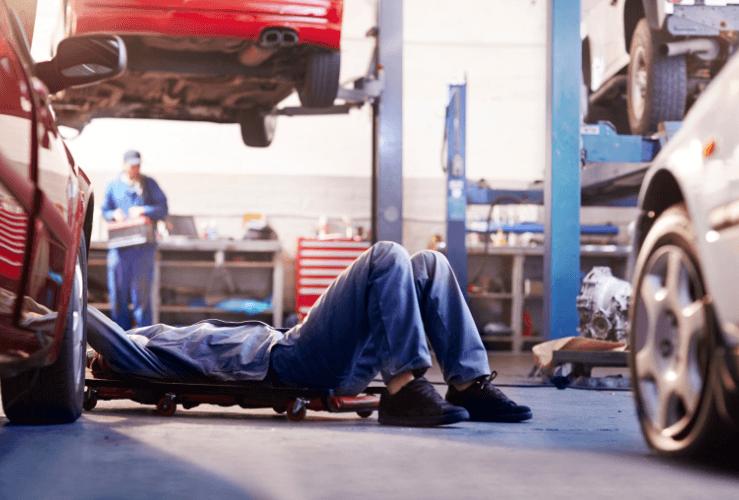It's a common scenario: Your trusty old car has broken down and the garage has given you an estimate for repairs. Your brow furrows.
Should I fix my car, or start thinking about buying a new vehicle?
The answer of course is: it depends.
Your best course of action will take a little thought and, unfortunately, some maths.
Here are five steps to determine whether you should ditch your old set of wheels in favour of a newer car, or invest in repairs and keep it on the road.

How much will it cost to fix my car?
What's wrong with my car? How much will it cost to get fixed? Answers to these questions will be key to the 'repair or sell' conundrum.
Get an estimate for repairs - or better yet, get a few.
If it’s a relatively minor issue such as a faulty battery, you might be looking at a £70 bill. But if the engine is kaput, you could be talking well over £1,000. Even installing a used engine will add up when labour is factored in.
If you know what the issue is, online tools such as ClickMechanic and WhoCanFixMyCar can give an idea of how much the bill might be. Simply enter your registration and the work that needs doing. These services will also suggest a repair provider.
Do your sums
If the repair cost is higher than the current market value of your car, it could be time to think about a newer vehicle.
Even if the repairs are half the market value, you might think twice about keeping the car.
Equally, if the estimate exceeds a year's worth of monthly car payments, it could be time to sell your faulty car.
As an example, if your vehicle is worth £8,000 and the repair cost is £1,000, getting it fixed makes sense.
But if it's worth £2,000 and the repairs are £1,000, you might question the wisdom of keeping it on your driveway.
If you've been flirting with the idea of getting a new vehicle for a while, this could give you the reason you need.
Online tools to work out value of car
Calculate the value of your car by using online tools from AutoTrader and Parkers.
Simply enter your registration and mileage to get an estimate.

Work out your annual repair and maintenance costs
Repairs and ongoing maintenance are necessary for every car - to keep it in safe working order and to prevent minor issues from becoming major ones.
But older cars may require more repairs, which can add up over the year.
Work out how much you spent on repairs in the previous 12 months.
Even if the final sum is several hundred pounds, it could still be considerably cheaper to keep the old car on - in preference to forking out for a newer one.
List the pros and cons
The answer to the 'repair or sell' question will affect your finances, and if you choose the latter, it will involve more time, effort and possibly stress.
Should you repair your old car?
Here are the main pros and cons of repairing your vehicle:
Pros for repairing your old car
- You won't need to spend time and effort finding a buyer
- You won't need to hunt around for a newer car
- You won't have to worry about getting a new insurance deal set up
- You understand the foibles of your current car and its history
- No additional monthly payments

Cons of repairing your old car
- It's likely repairs will be more frequent as time goes on
- You might face bigger, more costly repair jobs over time
- You may have concerns over how to pay for future repairs and breakdowns
Should you sell your old car?
Here are the main pros and cons of selling your vehicle:
Pros of selling your old car
- You should be able to relax more because a newer car is less likely to break down
- A newer car may be more fuel efficient, saving you money
- You'll get to enjoy a newer car
- Any warranty or subsidised maintenance deal will give you more peace of mind
Cons of selling your old car
- If you don’t buy outright, you'll be looking at a loan/monthly repayment plan
- You'll have to repair the vehicle sufficiently to sell it
- Time and effort will be needed to sell your old car
- Updated (probably more costly) insurance and other fees to consider
- You'll need to get used to driving a different car
Make a final decision based on the facts
Having done the sums, by now you'll have a better idea of whether to repair or sell.
Buying a newer vehicle may mean you'll worry less about repairs. On the other hand, the cost of a new car may not suit your current budget - and overstretching your household finances might be just as stressful.
Then again, if you do stump up for repairs, how much longer will your current car last? Are you delaying the inevitable? Or do I think it will run for another few years with only minor maintenance?
Your local garage may be able to offer advice on whether or not it’s best to repair or sell - but bear in mind they have a vested interest in you keeping it on the road!
Online forums, YouTube videos and mechanically-minded friends and family may also be able to offer advice on the topic.
Understanding Market Demand and Car Valuation
Before making your final decision, it’s worth looking at how market demand and your car’s valuation compare. Used car prices have fluctuated in recent years, meaning your vehicle’s trade in value may be higher than expected.
According to Auto Trader’s Retail Price Index (May 2025), the average retail price of a used car stands at around £16,825 (Auto Trader, 2025). Even vehicles over ten years old maintain an average value of roughly £6,500 (Auto Trader Insight Blog, 2025).
By contrast, the average scrap value for a car in 2025 is around £228 (CarTakeBack, 2025), with typical scrap returns ranging between £200 and £400.
This comparison highlights how even vehicles with higher repair costs can still hold decent trade in value – especially if they are popular models in high demand.
Before deciding to scrap your car, check online valuation tools or speak to dealers about potential trade-in offers. Understanding these market trends can help you weigh the real cost of keeping versus selling your vehicle.

Sell my broken car
If you decide that repairing your car is simply too expensive, or if you expect ongoing mechanical problems, there are a number of ways to sell it.
Websites such as WeBuyAnyCar may be able to help you sell your old car quickly.
You can simply enter your car's details online for a valuation.
However, your car may fetch a higher price if you sell privately - but this will involve time, effort, and probably stress.
Sell faulty car: time to scrap?
You may decide your car is beyond repair. This is more likely to be the case if it is more than 10 years old, is suffering serious corrosion - and of course if a major and costly repair is needed.
If so, you might enlist a scrap merchant to remove and dispose of the vehicle.
They may offer you a token amount, take it away with no money changing hands, or charge you a fee. Which of these may depend on how much they believe they can sell the parts for.
Need car repair: no money
Many of us need our cars for work, grocery trips, school drops and other errands. But what if your car breaks down and you don't have the money to repair it?
Options include:
Pay with a credit card
Ensure you make repayments swiftly to avoid large interest payments.
You will of course need to have funds available in the near future to cover these costs.
Personal or payday loan
As long as you know you'll be able to cover the repayments without overstretching the household budget, this could be an option.
Payment plan with the repair shop
Some garages may allow you to pay the bill off over several months.
Be aware of any interest and don't agree to the plan unless you can cover the repayments comfortably.
Ask friends or family for help
Wait until you have enough money
Could you use public transport, walk or cycle until you have funds for repairs?
Unless you live in a remote location, running a car may not be an immediate necessity.
Frequently Asked Questions
Selling your car can offer several advantages. Financially, it allows you to recover some of your investment and potentially access a good trade in value if market demand is strong. It can also be more convenient if you’re facing rising repair costs and frequent breakdowns.
Additionally, understanding the market before you sell gives insight into what buyers are looking for, helping you achieve a fair and timely sale.





